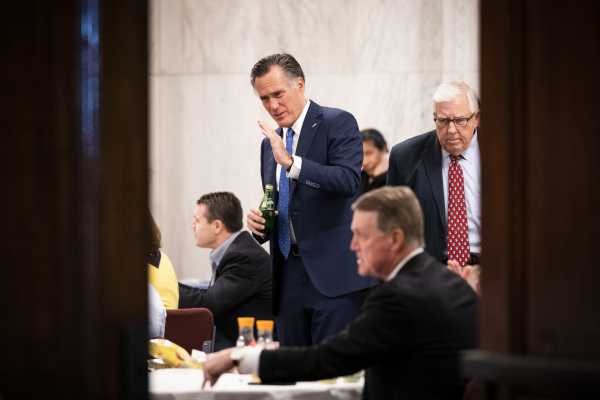
The US Senate is still at odds over its multitrillion-dollar bill meant to help Americans, small businesses, and corporations deal with the economic fallout from Covid-19. Senate Democrats blocked the bill on Sunday, wanting more limits on bailouts to corporations and more extensive measures expanding the safety net for individuals.
The bill is known as the “phase three” bill in Congress’s coronavirus response. The phase one bill, signed on March 6, offered $8.3 billion to the Centers for Disease Control and Prevention, vaccine development, and other public health measures. The phase two bill, signed on March 18, cost on the order of $104 billion, expanded paid sick leave for a subset of workers, offered free coronavirus testing to Americans, and gave modest boosts to unemployment insurance and food stamps.
The “phase three” bill, also called the CARES (“Coronavirus Aid, Relief, and Economic Security“) Act, is more on the order of $1.8 trillion, or 18 times the last bill. It’s a sprawling stimulus measure including roughly $300 billion in direct cash checks to American households, $350 billion in loans to small businesses to cover interruption in business, and $500 billion in other relief to businesses, largely through loan guarantees.

The bill also dramatically expands unemployment insurance. Independent contractors and the self-employed, typically not eligible for unemployment insurance, will be temporarily eligible for special “Pandemic Unemployment Assistance”; the federal government will take on a greater share of states’ unemployment payments; “work-sharing” programs where unemployment insurance pays companies to reduce workers’ hours rather than lay them off are expanded; and unemployment checks are increased by $600 a week across the board, a huge spike given the median weekly pay in the US is $936.
However, the bill is not on President Trump’s desk for signing yet. There are still a number of sticking points for Senate Democrats, who blocked the bill on Sunday. Here are the problems Democrats still have with the measure, per leaked talking points:
1) Not enough protections on $500 billion for businesses
The bill’s $500 billion in business support includes $425 billion in loan guarantees, $50 billion for airlines, $8 billion for cargo air companies, and $17 billion for firms “critical to national security.” The fund is overseen by the Treasury Department and Secretary Steven Mnuchin has wide latitude over how to use it.
While there is language meant to protect workers and prevent the money from being used on giveaways to investors, such as stock buybacks, Democrats think that language is far too weak; Mnuchin himself can waive it in some cases. “We’re gonna give $500 billion in basically a slush fund to help industries controlled by Mnuchin with very little transparency? Is that what we ought to be doing?” Sen. Mazie Hirono (D-HI) asked Politico.
Add to this the fact that on Sunday, Trump specifically refused to rule out offering assistance to his own companies (“let’s just see what happens”), and you have Democrats worried not just about a corporate bailout but about potential corruption by a president they already voted to impeach.
2) No money to people who don’t earn enough to file taxes
The latest version of the Senate bill offers its full cash benefits — $1,200 per adult tax filer, $500 per child — to even the poorest Americans, correcting a big problem with the first GOP draft of the bill that left out low-income people entirely. But you need to have filed taxes for 2018 or 2019 to get the benefit, which leaves out millions of Americans who do not typically need to file.
Nonfilers typically either rely on mostly nontaxable income — like Social Security retirement or disability benefits or retirement income from a Roth account — or do not have enough money to owe taxes. Either way, they tend to be among the most economically vulnerable people in the country.
Democrats want to use tools the federal government has to get cash directly to those people without requiring them to fill out unnecessary paperwork.
3) Not enough state aid, SNAP money, health money
The Democratic talking points note that the bill doesn’t do anything to strengthen the food stamp program — one of the most effective economic stabilizers we have — or to provide cash to state and local governments that, unlike the federal government, operate on balanced budget constraints and so are likely to raise taxes or cut spending as the crisis goes on. Democrats also want funding for uninsured people who fall sick during this crisis.
4) No protections against eviction, foreclosure
The Trump administration has already taken actions to prevent foreclosures of mortgages insured by the Federal Housing Administration or Fannie May/Freddie Mac. But that hardly covers all homeowners and doesn’t do much for renters. Democrats objected that the Senate bill has “no specific provisions to protect individuals from eviction, foreclosure, or forbearance.”
5) No student loan forgiveness
Democrats, up to and including presumptive Democratic nominee Joe Biden, are demanding at least $10,000 in federal student loan forgiveness per student as part of the package. Trump has suspended payments on student loan payments for the next 60 days and frozen interest, but he has stopped short of forgiving the underlying debt.
Sourse: vox.com






